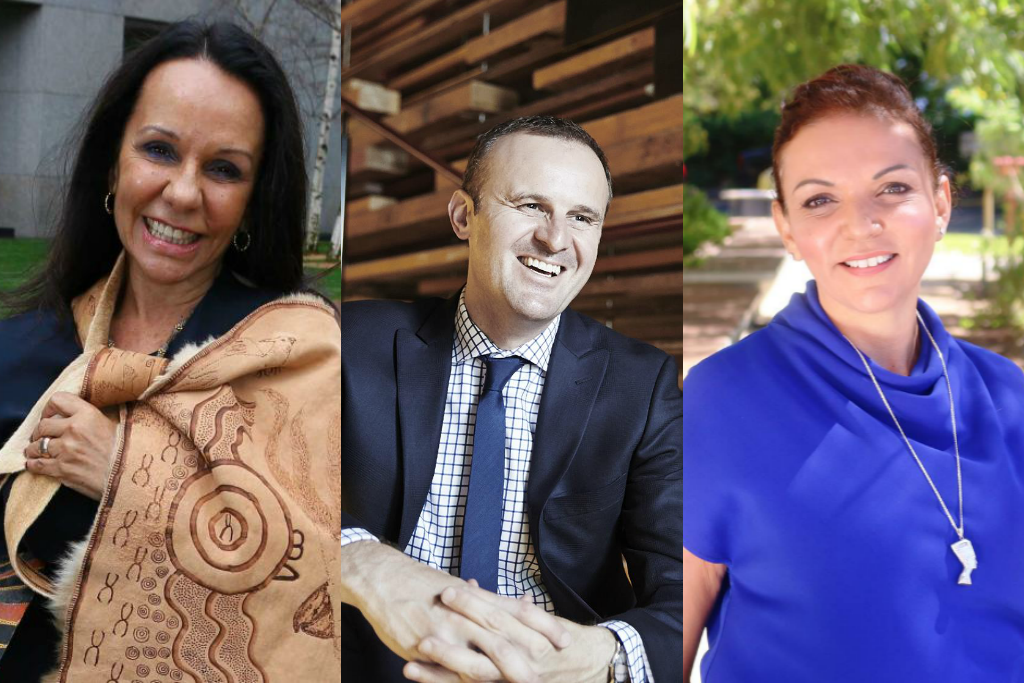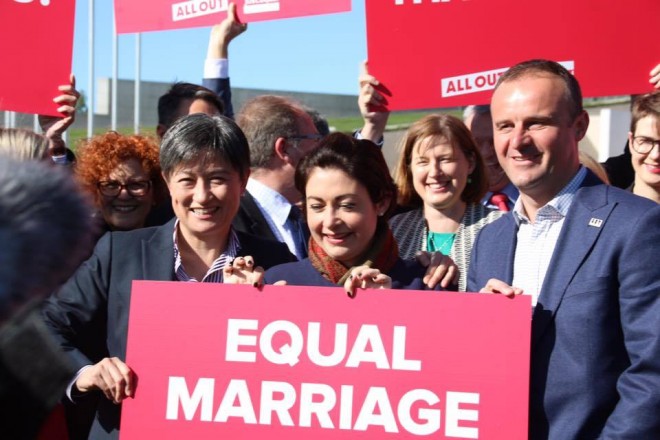We’ve Had A Groundbreaking Year In Politics, But Is It Leading To Actual Change?
Australia politics is slowing becoming more diverse, but is that having any impact on policy?

I think we can all agree that we’ve seen some pretty dark days in Australian politics of late. Like a rainbow at the end of a bad storm, however, some positive news came earlier this week with the results of the ACT general election — and a rainbow it was indeed.
In case you missed it, the ACT Labor Party secured a fifth consecutive term in government, forming a minority government with the Greens. What is most exciting about this election win, however, is that Chief Minister Andrew Barr became the first openly-LGBTQIA* elected head of government in Australia. Barr has held the position since 2014 following the resignation of his predecessor, Katy Gallagher, who is now a federal Senator for the ACT. But two years later, he has now won the position in his own right.
This is remarkable considering the historical social and political injustices toward the LGBTQIA* community in Australia, many of which persist to the present day. But, as unique as Barr’s election victory is, it also feels familiar. This is just one of many ‘firsts’ in Australian politics in 2016.
–
Our Parliaments Are (Slowly) Becoming More Diverse
This year’s federal election saw Linda Burney, the first Indigenous woman, elected to the Australian House of Representatives for the seat of Barton. Burney had previously made political history when she became the first Indigenous person elected to NSW Parliament in 2003. During her time in politics, Burney has advocated for the rights and recognition of Indigenous Australians.
Joining Burney in the Australian House of Representatives is Dr Anne Aly from the seat of Cowan. At the recent federal election Aly became the first woman of Muslim faith to be elected to the federal parliament. The counter-terrorism expert used her first speech, presented on the Muslim holiday Eid al-Adha, to call for a “reasoned, balanced and, above all, smart response to the threat of terrorism”.
The 2016 federal election also made political history in the seat of Brisbane. Here we saw the Liberal National Party’s Trevor Evans and the Labor Party’s Pat O’Neil contest the seat — a historic contest because it was the first federal electorate where both the major party candidates were openly gay-identifying.
When Trevor Evans won the seat, he joined Tim Wilson, Julian Hill and Trent Zimmerman as the only four openly gay-identifying members of the Australian House of Representatives. Zimmerman became the first openly LGBTQIA* identifying member of the lower house in 2015 when he won the North Sydney by-election.
This is all great and long overdue, but the question remains: with these political trailblazers stepping into their new roles, is the state of Australian politics likely to change? Are the presence and perspectives of Barr, Burney, and Aly likely to have a positive impact on the social policies produced by our parliaments?
The short answer is, as most would agree, no.
–
Will These ‘Firsts’ Mean We Get Better Policies?
When someone in public life identifies as a particular identity, their public voice can often be somewhat restricted. They can be pigeonholed as ‘the [gay, Aboriginal, Muslim, etc.] person in parliament’, and expected to deal exclusively with issues pertaining to their community, and little else.
Linda Burney commented on this during her first speech, signalling that while her identity will inform her politics, she will not assume the role of Aboriginal spokesperson in the federal parliament. “The Aboriginal part of my story is important. It is the core of who I am, but I will not be stereotyped and I will not be pigeonholed,” she said.
The notion that recognition will divide us is wrong. Not acknowledging 40000+ years of history is divisive #RecognitionYesNo
— Linda Burney MP (@LindaBurneyMP) September 20, 2016
This has also been apparent in the discussion regarding same-sex marriage. While in the current federal parliament there are eight openly-LGBTQIA* identifying politicians, the majority of these have been elected in the last five years. Prior to this, Labor’s Penny Wong was often called upon to weigh in on the same-sex marriage debate as she was one of the only openly-gay people in parliament.
This was particularly relevant in regard to Labor’s policy on marriage equality at the time, where the party caucus and leadership were firmly against changing the definition of marriage and Wong was consequently required to abide by party lines when speaking on the issue, contrary to her own personal views.
The expectation placed upon parliamentarians from diverse identities to act as a spokesperson for their particular community places unnecessary levels of responsibility upon people who have a broader duty to represent their party, electorate, state or portfolio.
Wong’s extensive career in the Labor Party further demonstrates this tension. Despite her position of influence, it took a considerable amount of time for the caucus to change its position on the matter of marriage equality.
This has been a similar reality for openly-LGBTQIA* incumbent members of the Coalition parties in regard to recent same-sex marriage debates.
Though four of the eight openly-LGBTQIA* members in the Australian Parliament belong to the Liberal and National parties, their capacity to sway the government’s approach to marriage equality hasn’t been shown to be that influential.
This is especially relevant to Liberal Senator Dean Smith, who has been very public in his views against the LNP’s proposed plebiscite on marriage equality — albeit this opposition is based on the legitimacy of Australia’s representative democracy rather than his sexuality.
The same considerations can also be applied to Andrew Barr.

Photo via Andrew Barr/Facebook
In the same year that we have our first openly-LGBTQIA* identifying elected head of government, the federal government has made it clear it would rather have policies on issues like marriage equality that reflect the views of a conservative few instead of the majority of Australian voters.
Barr has spoken publicly against the plebiscite and, instead, advocates for marriage equality through a free vote in federal parliament. In August, his government passed a motion through the ACT legislative assembly reiterating the territory’s position against a plebiscite and instead for a respectful approach to equality via the legislative processes.
Barr was a key proponent in the ACT’s push for marriage equality in 2013, when the Gallagher government passed an act to legalise same-sex marriage in the territory which, though short-lived, indicated that equality via legislation is politically achievable.
If the experiences of LGBTQIA*-identifying politicians within marriage equality debates are an indication, perhaps the election of Burney, Aly and even Barr may not actually result in a positive shift in social policy. Sure, there is no doubt that our parliaments — both state and federal — should be more inclusive. But until they are truly representative of our society it seems unlikely that policies will be catered to the diverse needs of contemporary Australia.
Personally, I can’t wait for the day when we can finally stop counting ‘firsts’ and instead treat the appointment of people like Barr, Burney and Aly as a matter of normality than irregularity.
–
James Atkinson is a student at the Australian National University in Canberra. He is interested in politics, culture, and education.